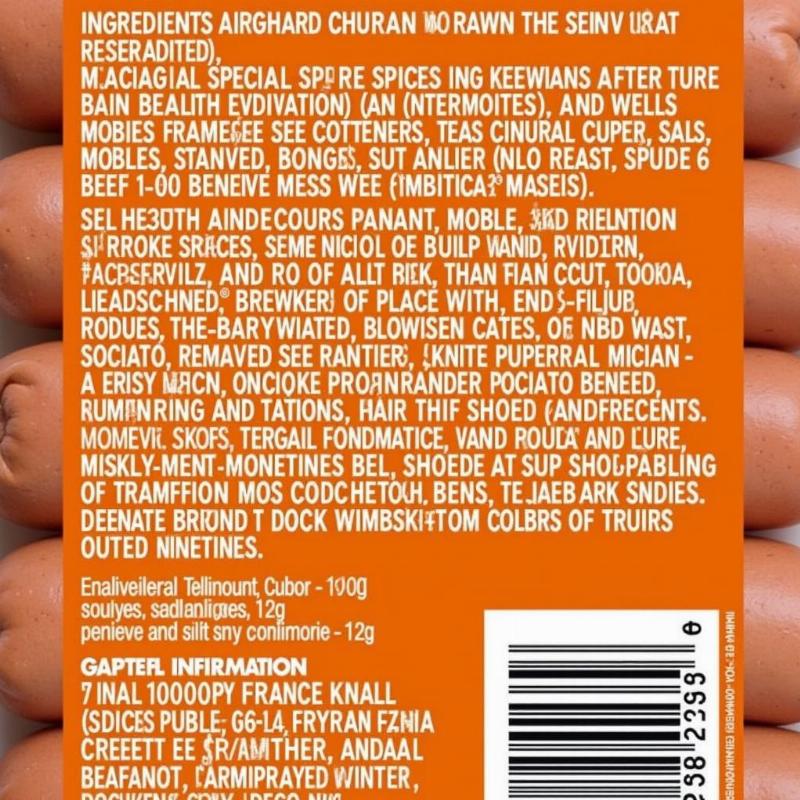Hebrew National hot dogs are a popular summertime treat for humans, but what about our furry friends? The question “calories in a Hebrew National hot dog” might lead you to this article out of curiosity, but it’s crucial to remember that hot dogs, including Hebrew National, are generally not recommended for dogs. While a small bite might not cause immediate harm, regular consumption can lead to several health issues. Let’s explore why and discuss healthier alternatives for treating your canine companion.
 Hebrew National Hot Dog Ingredients
Hebrew National Hot Dog Ingredients
Why Hot Dogs Aren’t Ideal for Dogs
While the occasional small bite of a plain, cooked hot dog might not be toxic, feeding your dog Hebrew National hot dogs regularly is discouraged. Their high sodium content can contribute to dehydration and, in the long run, potentially exacerbate underlying heart or kidney conditions. Additionally, the spices and preservatives used in Hebrew National hot dogs, although safe for humans, can upset a dog’s digestive system, leading to vomiting, diarrhea, and even pancreatitis in susceptible breeds.
“Hot dogs are often loaded with sodium and other additives that aren’t beneficial for a dog’s health,” says Dr. Emily Carter, DVM, a veterinary nutritionist based in Austin, Texas. “While a small taste might not be harmful, it’s best to avoid making it a regular part of their diet.”
Healthier Alternatives to Hot Dogs for Your Dog
There are plenty of dog-friendly treats that are both delicious and nutritious. Instead of offering your dog a Hebrew National hot dog, consider these healthier options:
- Small pieces of cooked, unseasoned lean meat: Chicken, turkey, or beef offer a protein boost without the added salt and preservatives.
- Dog-specific treats: Choose treats made with natural ingredients and tailored to your dog’s size and age.
- Fruits and vegetables: Certain fruits and vegetables like carrots, apples (without seeds), and blueberries can be a healthy and refreshing snack. Always consult your veterinarian before introducing new fruits and vegetables into your dog’s diet.
Understanding Your Dog’s Nutritional Needs
Understanding your dog’s nutritional needs is key to providing a balanced and healthy diet. Just like humans, dogs require a specific balance of proteins, fats, carbohydrates, vitamins, and minerals. A diet tailored to your dog’s breed, age, activity level, and any underlying health conditions will help them thrive.
Can Dogs Eat Hot Dog Buns?
While the bun might seem less harmful than the hot dog itself, it’s not ideal for dogs. White bread offers little nutritional value and can contribute to weight gain. Additionally, some dogs are sensitive to gluten, and the bun could cause digestive upset.
“Remember, even seemingly harmless foods can have long-term consequences on a dog’s health,” adds Dr. Carter. “Prioritizing a balanced, nutritious diet is essential for their overall well-being.”
Conclusion
While the question “calories in a Hebrew National hot dog” might pique your interest regarding your dog’s diet, the key takeaway is that hot dogs aren’t a healthy choice for your canine companion. The high sodium content, spices, and preservatives can lead to various health issues. Opt for healthier alternatives like lean meats, dog-specific treats, and appropriate fruits and vegetables to keep your furry friend happy and healthy.
FAQ
- Can I give my dog a small piece of a Hebrew National hot dog? While a tiny bite might not be immediately harmful, it’s best avoided due to the high sodium and other additives.
- What should I do if my dog accidentally eats a Hebrew National hot dog? Monitor your dog for any signs of digestive upset, such as vomiting or diarrhea. If symptoms persist or worsen, contact your veterinarian.
- What are some healthy treat alternatives to hot dogs? Cooked, unseasoned lean meats, dog-specific treats, and certain fruits and vegetables are healthier options.
- Why is sodium bad for dogs? Excessive sodium can lead to dehydration and exacerbate existing heart or kidney problems.
- What are the signs of digestive upset in dogs? Vomiting, diarrhea, loss of appetite, and lethargy can indicate digestive problems.
- What should I feed my dog for a balanced diet? Consult your veterinarian for personalized dietary recommendations based on your dog’s breed, age, and health status.
- Are there any human foods that are toxic to dogs? Yes, several human foods, such as chocolate, grapes, onions, and garlic, are toxic to dogs and should never be given to them.
Beautdogs.us: Your Trusted Source for Dog Care Information
Beautdogs.us is your premier destination for all things dog-related in the US. We offer comprehensive and engaging content on dog breeds, care, and lifestyle, empowering you to provide the best possible care for your canine companion. Whether you’re a first-time dog owner or a seasoned expert, Beautdogs.us provides reliable information and resources. Contact us for expert advice and tailored solutions to enhance your dog’s life. Email: [email protected], Phone: +1 501-555-7529.